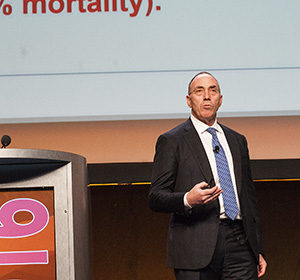
Michael A. Gropper, M.D., Ph.D.: ‘Once you get the culture of this going, people see the benefits and they will be your best friends.’
Early in their history, ICUs were almost a waiting room for mortality, but that attitude is long gone because of changes in culture as much as changes in treatment. In his FAER-Helrich Research Lecture Monday, Michael A. Gropper, M.D., Ph.D., reviewed the positive effects of those changes.
In “Harm Prevention in Critical Care: A Transprofessional Journey,” Dr. Gropper talked about the cultural and technical changes implemented at the University of California, San Francisco (UCSF), including a program to get families more involved in ICU care. He is Professor and Chair of the Department of Anesthesia and Perioperative Care at UCSF.
A variety of complications occur in ICUs, but some that have been overlooked include delirium, ICU-acquired weakness and PTSD that affects patients and families. A good theme in combating these issues is to do less, Dr. Gropper said. Less includes tidal volumes, insulin, sedation, fluid, blood, catheters, colloids, benzodiazepines, antibiotics, corticosteroids and oxygen.
It has been estimated that up to three-fourths of ICU patients have delirium, and Dr. Gropper suggested that more attention be paid to the problem.
“Looking at cognitive scores, these patients had dysfunctions a year later,” he said. “You might expect this in patients with Alzheimer’s or traumatic brain injury, but this is across the board. This is devastating.”
ICU-acquired weakness is a result of patients staying in bed too long and receiving treatments they often do not need. It occurs in up to 50 percent of patients and persists for years after discharge. Only half of survivors of critical illness return to work within one year. Dr. Gropper said that early mobility is the answer.
“The impact is remarkable. Almost everything was improved with early mobilization,” he said of how patients reacted when they were encouraged to start walking sooner. This was first resisted by ICU staffs for fear of falls or pulling out lines, but that did not happen.
“Once you get the culture of this going, people see the benefits and they will be your best friends. Family members love helping with this. They need something to do (while waiting at the hospital),” Dr. Gropper said.
Another positive impact at the UCSF ICUs came from Project Emerge, which redesigned health care to not only prevent harm but to promote efficiency by looking at the culture, technology and workflow in two of the ICUs.
Among the findings: There are too many devices that don’t communicate with one another, and they have too many false alarms; staffs used low-tech solutions such as scribbled notes to ensure completion of tasks; too much time was spent at computers.
The program trained all staff members in the science of safety and engaged the staff to identify defects in the ICU and implemented changes.
“You need to learn from defects and develop tools,” Dr. Gropper said. “Everybody does training. Once we have fixes, we can spread them across to other ICUs.”
Defects are submitted by staff members each month after the training. “Once you get this up and running, people embrace it. It is very powerful,” he said.
The project also developed online portals, such as a harms monitor display that offered quick solutions when dealing with harms. Also developed was a portal so family members could enter information about patients so staff members knew more about them. It also explained how the ICUs operated and explained how devices worked.
“We recently added former patients and family members to the team to help design care,” Dr. Gropper said, adding that focusing on treating patients with respect and dignity paid off. “Patients and families appreciate that we ask about these things.”
Return to Archive Index